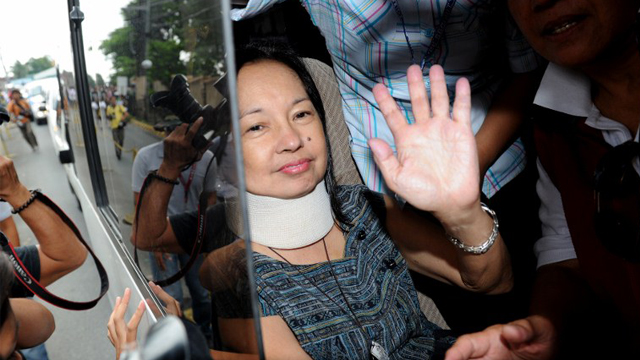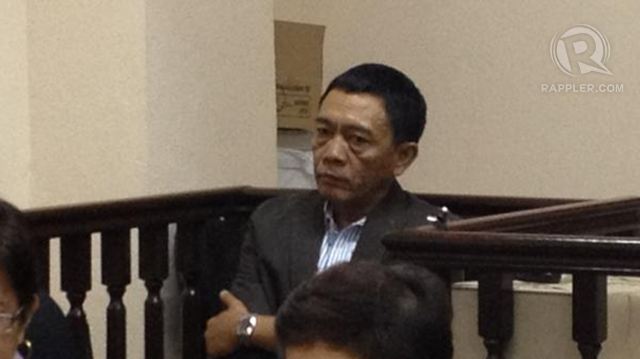SUMMARY
This is AI generated summarization, which may have errors. For context, always refer to the full article.
MANILA, Philippines – What does it mean when the strongest witness leaves the court unconvinced?
When Pasay Regional Trial Court (RTC) Branch 112 granted bail to former President Gloria Macapagal-Arroyo, it meant the prosecution – the Commission on Elections (Comelec) – failed to convince the court the evidence of guilt is strong. In particular, the court referred to the testimony of the Comelec’s star witness, former Maguindanao provincial administrator Norie Unas.
Court spokesperson Felda Domingo cited Unas’ admission that he testified “because of the condition that he will be exempted from any criminal charges against him.” “From that statement, the court doubted his testimony,” Domingo said Wednesday, July 25, when the court granted Arroyo bail.

The case, for critics, is simply rushed and weak.
Railroaded case
In a special report in November 2011, Newsbreak reported that the Comelec “junked its own rules, cut short due process, and went against previous rulings of the Supreme Court” in filing the electoral sabotage case against Mrs Arroyo that month.
Brillantes acknowledged then that the Comelec “suspended the rules” to bring the case to court and stop Mrs Arroyo from leaving the country. He cited the “nature of the case” and its “historic” significance. (At that point, the Supreme Court had issued a temporary restraining order — a TRO — on the government’s order barring Mrs Arroyo from travelling abroad. Mrs Arroyo and husband Mike attempted to leave the country on the day it was issued, Nov 15, 2011, but were stopped by the government at the airport. The TRO eventually triggered the impeachment of then Chief Justice Renato Corona.)
In particular, the Comelec did not make room for Mrs Arroyo’s motion for reconsideration on an en banc resolution regarding the case. This was their vote on the results of a joint Department of Justice-Comelec panel on alleged electoral fraud in 2007.
Meeting en banc on a Friday morning, Nov 18, 2011, the Comelec voted to accept the results of a joint Department of Justice-Comelec investigation panel on the former president’s involvement in alleged electoral fraud in the 2007 senatorial race. A couple of hours later, at mid-morning, the poll body filed an electoral sabotage case against Mrs Arroyo and two others before the Pasay RTC Branch 112. At 4 p.m. on the same day, Judge Jesus Mupas ordered Mrs Arroyo’s arrest.
The Comelec rule they broke supposedly allowed an aggrieved party to contest the case.
“A motion to reconsider a decision, resolution, order, or ruling of a division shall be filed within 5 days from the promulgation thereof. Such motion, if not proforma, suspends the execution or implementation of the decision, resolution, order, or ruling,” said Sec 2 of Rule 19 of the Comelec Rules of Procedure.
An election lawyer, who refused to be named, told Newsbreak the Comelec violated basic due process. “The procedure was cut short. Due process is a constitutional right. The railroading of the case could render the case null and void,” he said.
Woes vs star witness
The Pasay RTC Branch 112 eventually allowed the case to proceed. Because the case was supposedly done in haste, however, Comelec’s critics claimed the evidence is weak.
They particularly cited the star witness’ poor quality.
A former right-hand man of former Maguindanao Gov Andal Ampatuan Sr, Unas alleged Mrs Arroyo instructed Ampatuan to rig the 2007 senatorial elections. “Dapat 12-0 sa Maguindanao, kahit pa ayusin o palitan ninyo ang resulta,” the former president allegedly said. (It should be 12-0 in Maguindanao in favor of the administration, even if you have to manipulate the results.)

Unas himself, however, admitted he did not personally witness cheating in 2007. “I have not seen how they did it but I know they are doing it,” he said during Mrs Arroyo’s bail hearing on June 14.
Activist groups have sharply criticized the government for the case’s weaknesses.
During their rally when Mrs Arroyo was released Wednesday, protestors said President Benigno Aquino III should be held accountable for this.
In a previous statement, activist leader Renato Reyes Jr said, “The Aquino government will surely be to blame if Arroyo goes out on bail. It would be a big disservice to the people and a huge embarrassment for this mediocre government.”
‘Good lesson’
When the court allowed Mrs Arroyo to post bail, Brillantes said this is “just the bail hearing” and “we still have to go through the trial on the merits of the case.” But he said this can be a “good lesson” that Comelec still needs to firm up or present additional evidence on the case.
The Comelec on Thursday, July 26, will formally oppose Mrs Arroyo’s release.
In the meantime, Mrs Arroyo travels to the highlands of Tagaytay – to seek alternative treatment and to savor the moments she is free due to a “weak” case. – Rappler.com
Add a comment
How does this make you feel?
There are no comments yet. Add your comment to start the conversation.